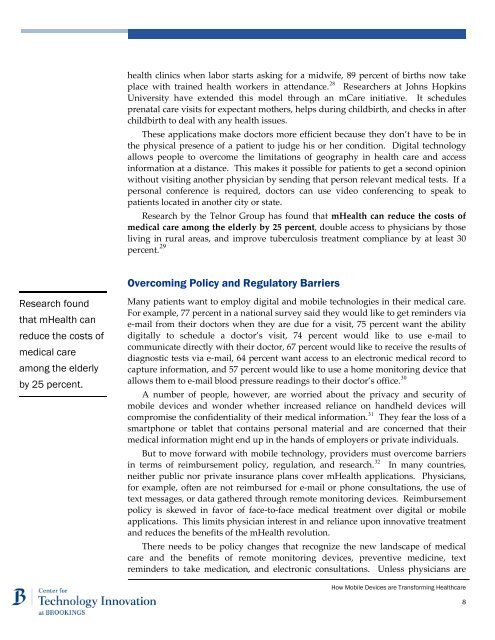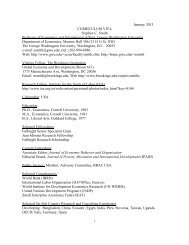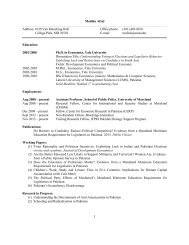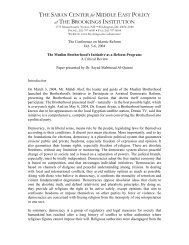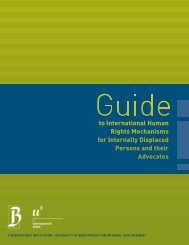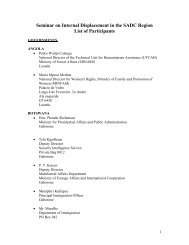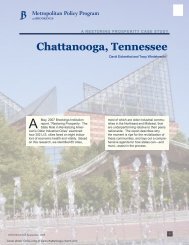How Mobile Devices are Transforming Healthcare - Brookings ...
How Mobile Devices are Transforming Healthcare - Brookings ...
How Mobile Devices are Transforming Healthcare - Brookings ...
Create successful ePaper yourself
Turn your PDF publications into a flip-book with our unique Google optimized e-Paper software.
Research found<br />
that mHealth can<br />
reduce the costs of<br />
medical c<strong>are</strong><br />
among the elderly<br />
by 25 percent.<br />
health clinics when labor starts asking for a midwife, 89 percent of births now take<br />
place with trained health workers in attendance. 28 Researchers at Johns Hopkins<br />
University have extended this model through an mC<strong>are</strong> initiative. It schedules<br />
prenatal c<strong>are</strong> visits for expectant mothers, helps during childbirth, and checks in after<br />
childbirth to deal with any health issues.<br />
These applications make doctors more efficient because they don’t have to be in<br />
the physical presence of a patient to judge his or her condition. Digital technology<br />
allows people to overcome the limitations of geography in health c<strong>are</strong> and access<br />
information at a distance. This makes it possible for patients to get a second opinion<br />
without visiting another physician by sending that person relevant medical tests. If a<br />
personal conference is required, doctors can use video conferencing to speak to<br />
patients located in another city or state.<br />
Research by the Telnor Group has found that mHealth can reduce the costs of<br />
medical c<strong>are</strong> among the elderly by 25 percent, double access to physicians by those<br />
living in rural <strong>are</strong>as, and improve tuberculosis treatment compliance by at least 30<br />
percent. 29<br />
Overcoming Policy and Regulatory Barriers<br />
Many patients want to employ digital and mobile technologies in their medical c<strong>are</strong>.<br />
For example, 77 percent in a national survey said they would like to get reminders via<br />
e-mail from their doctors when they <strong>are</strong> due for a visit, 75 percent want the ability<br />
digitally to schedule a doctor’s visit, 74 percent would like to use e-mail to<br />
communicate directly with their doctor, 67 percent would like to receive the results of<br />
diagnostic tests via e-mail, 64 percent want access to an electronic medical record to<br />
capture information, and 57 percent would like to use a home monitoring device that<br />
allows them to e-mail blood pressure readings to their doctor’s office. 30<br />
A number of people, however, <strong>are</strong> worried about the privacy and security of<br />
mobile devices and wonder whether increased reliance on handheld devices will<br />
compromise the confidentiality of their medical information. 31 They fear the loss of a<br />
smartphone or tablet that contains personal material and <strong>are</strong> concerned that their<br />
medical information might end up in the hands of employers or private individuals.<br />
But to move forward with mobile technology, providers must overcome barriers<br />
in terms of reimbursement policy, regulation, and research. 32 In many countries,<br />
neither public nor private insurance plans cover mHealth applications. Physicians,<br />
for example, often <strong>are</strong> not reimbursed for e-mail or phone consultations, the use of<br />
text messages, or data gathered through remote monitoring devices. Reimbursement<br />
policy is skewed in favor of face-to-face medical treatment over digital or mobile<br />
applications. This limits physician interest in and reliance upon innovative treatment<br />
and reduces the benefits of the mHealth revolution.<br />
There needs to be policy changes that recognize the new landscape of medical<br />
c<strong>are</strong> and the benefits of remote monitoring devices, preventive medicine, text<br />
reminders to take medication, and electronic consultations. Unless physicians <strong>are</strong><br />
<strong>How</strong> <strong>Mobile</strong> <strong>Devices</strong> <strong>are</strong> <strong>Transforming</strong> Healthc<strong>are</strong><br />
8


